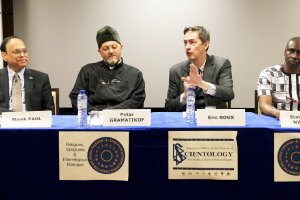Translating the Bible into all the world’s languages is a formidable undertaking that has long presented challenges. Now two researchers are exploring the potential of recent advancements in artificial intelligence to aid in the monumental endeavor.

Ulf Hermjakob, a senior research scientist at the University of Southern California Information Sciences Institute (ISI), and Joel Mathew, a senior engineer at ISI, recently introduced the Greek Room, an AI-driven technology designed to enhance the efficiency of the intricate biblical translation process.
To get an idea of just how challenging it is to translate the Bible, consider that the holy work consists of 66 books, and the widely used King James English version alone contains more than 700,000 words.
And now consider that although the Bible is the most translated written work on Earth, it exists in just a little over 700 of the world’s approximately 7,100 languages, many of them exceptionally uncommon.
Just imagine the painstaking task of transcribing each passage meticulously, line by line, word by word, and in certain instances, character by character, sometimes by hand.
The scientists from USC are developing tools utilizing natural language processing technologies to enhance the efficiency of the translation process, enabling a greater number of languages to be translated at an accelerated pace.
“We want to reach all the languages on Earth; the goal is to reach everyone,” Religion News Service quoted Mathew as saying in a July 5 article. In fact, one of the objectives of the technology that the researchers have created is to focus on “very low-resource languages that are not even in the top 500,” Mathew said.
The two researchers met in Los Angeles in 2015, when Mathew joined USC to pursue a master’s degree in computer science. Their connection grew strong as they discovered their mutual enthusiasm for languages and their Christian faith.
Having grown up as the child of two Bible translators in India, Mathew has directly witnessed the challenges associated with manual translation carried out by local church members. In his hometown of New Delhi, he diligently documented the various tasks that technology could potentially fulfill.
For example, as Mathew clarified, spell-checking typically demands a considerable number of individuals and a significant amount of time. When it comes to translating into uncommon languages, however, only qualified local church members are available for the task—and they often lack the necessary technological support for their work.
“These are not trivial problems; these are very hard problems,” Mathew told Religion News Service. “But big companies are not interested in solving them; it’s not their business model to target very rare languages.”
Through their project, Mathew and Hermjakob aim to address languages that lack a written system, grammar codes, dictionaries or spell-checkers altogether.
“We are thinking of languages like Uyghur or Oromo,” Hermjakob said, referring respectively to the tongue of the Turkic ethnic group from China’s northwestern Xinjiang province, and the language spoken in Ethiopia and northern Kenya.
One translation hurdle arises from the fact that some languages lack the very existence of certain concepts.
“There is a community living in the mountains, and they live in huts without doors, so there’s no concept of a door in their culture,” Mathew explained.
“In the Bible, there is a verse that says ‘behold I stand at the door and knock,’” he added. “The question is, how do you translate that for people so that it is meaningful for them?”
From its beginnings, the Church of Scientology has recognized that freedom of religion is a fundamental human right. In a world where conflicts are often traceable to intolerance of others’ religious beliefs and practices, the Church has, for more than 50 years, made the preservation of religious liberty an overriding concern.
The Church publishes this blog to help create a better understanding of the freedom of religion and belief and provide news on religious freedom and issues affecting this freedom around the world.
The Founder of the Scientology religion is L. Ron Hubbard and Mr. David Miscavige is the religion’s ecclesiastical leader.
For more information visit the Scientology website or Scientology Network.


